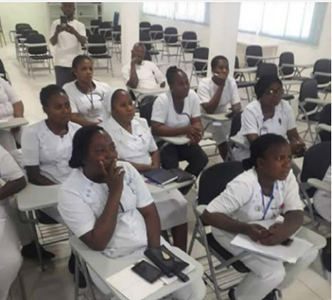.tmb-768v.png?Culture=en&sfvrsn=54737d84_1)
Adaptations of digital health interventions to maintain access, efficiency and quality of maternal care in Nigeria
Author
World Health Organization
This action brief is extracted from the series of key action briefs on “maintaining the provision and use of services for maternal, newborn, child and adolescent health and older people during the COVID-19 pandemic” published by the WHO Department of Maternal, Newborn,Child and Adolescent Health and Ageing. To access the series, please click here.
This brief was developed using information collected from existing documents as well as information captured through discussions with key institutional stakeholders. The views in this brief do not necessarily represent the decisions, policy or views of the World Health Organization.
Country
Nigeria
Key learning points
• Digital health applications hold the potential to contribute to maintaining access, efficiency and quality of care, and were a necessity during the COVID-19 crisis.
• Strong state leadership and commitment played a vital role in maintaining maternal and newborn health services; existing management structures contributed to the quick roll-out of adaptations in response to the pandemic.
• Engaging with women was a critical element that facilitated advocacy and contributed to satisfaction and high coverage of virtual sessions.
• Adoption of artificial intelligence and machine learning is important in high-demand, low-resource settings.
• Training the women who did not know how to use many smart phone features helped to build their digital literacy and enabled them to fully access and benefit from virtual activities.
• The use of non-monetary reward systems facilitates behavioural change.
Background
Nigeria had prioritized the use of technology to accelerate the attainment of UHC. Before the COVID-19 pandemic, the scale-up of digital health interventions in Nigeria was planned with the implementation of the National health information, communication and technology strategic framework 2015-2020.
Impact of COVID-19 on essential health services
Nigeria reported its first case of COVID-19 at the end of February 2020 and subsequently experienced four waves. The COVID-19 pandemic severely impacted the economy of Nigeria and caused disruption of health services nationwide. During the crisis, many Nigerians failed to access routine health services due to decreased income and lockdown restrictions. The most significant service disruptions were in maternal and newborn health, vaccination, sick childcare, family planning and noncommunicable disease treatment services.
Actions to maintain essential services
Reducing the Indirect Causes of Maternal Morbidity and Mortality Project (RICOM3) was a project that had started before COVID-19 pandemic with the goal of reducing the indirect causes of maternal morbidity and mortality in Nigeria by applying a quality-of-care model to improve prevention, early detection and management of indirect causes along the continuum of maternity care. As part of the COVID-19 response, the RICOM3 Project expanded its work to support pregnant and lactating women, and capitalized on existing structures to equip health workers with tools to provide care in the context of the pandemic. These included:
• Increased virtual tele- ECHO (Extension for Community Health Outcomes) sessions for health workers;
• Virtual tele-ECHO sessions for pregnant women and nursing mothers;
• Prioritization of high-risk pregnant women on the Complete Health Platform.

Outcomes of the implementation
A total of 12 tele-ECHO sessions were held from November 2019 to August 2020 with 2307 health workers. Tele-ECHO sessions attracting high attendance included:
• preparing ahead, what do I do for a pregnant woman with COVID-19?
• managing hypertension in sub-Saharan Africa in 2020: what do I need to know?
• diabetes in pregnancy: is the bark worse than the bite?
• COVID-19 in pregnancy: everything I need to know
• what should I do for my obese female patients?
A test based on the topic area was administered before and after each session or case study, and feedback was provided at the end. Across all 12 sessions, there was a 15% average increase in knowledge with a peak gain of 35% during the first COVID-19-related topic, “COVID-19 and pregnancy: everything you need to know!”. This peak may have reflected a lower baseline knowledge level than for other sessions.
Tele-ECHO sessions contributed to improved adherence by health workers to recommendations made by session subject matter experts, including implementing changes to service delivery processes.
Challenges
• High workload for the coaches on the digital platform was due to higher than expected participation of women.
• Digital literacy remains low in Nigeria and many women did not know how to use more than a few basic features.
• Adequate internet connection and digital devices were lacking meant health workers had to access the sessions in group in a health facility using one device.
• High staff turn-over in health facilities required repeating orientation sessions on the quality of care model for new staff.

